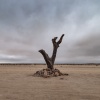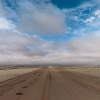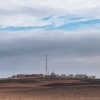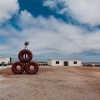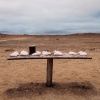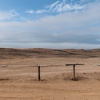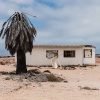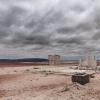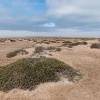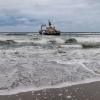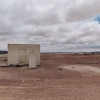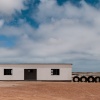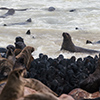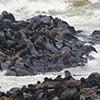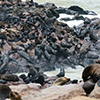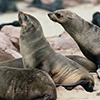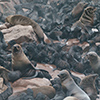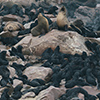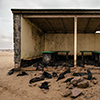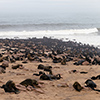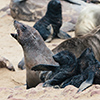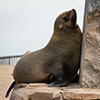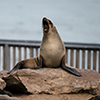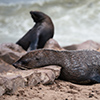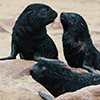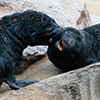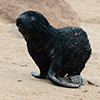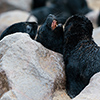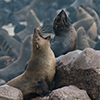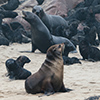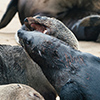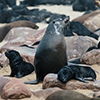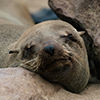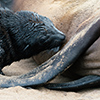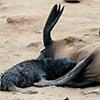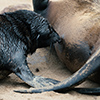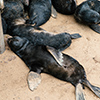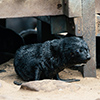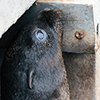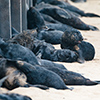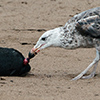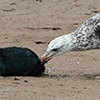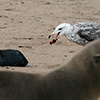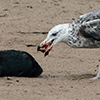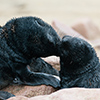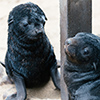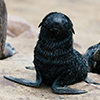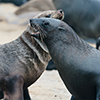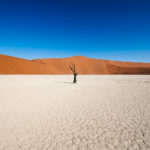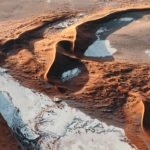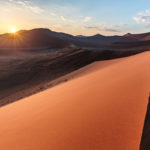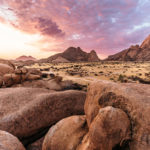Small Stinkers – The seal puppies of Cape Cross
If conditions are good, then life in Africa becomes literally exuberant. One of those places is Cape Cross, where about 250.000 brown fur seals romp about the cold but rich in nutriment waters of Benguela Current. The home of one of the largest seal colonies of the black continent has a large kindergarten full of cute seal puppets, but out in the water lie great white sharks in ambush.
Where Water meets the Desert
I come from the magic Spitzkoppe, the Matterhorn of Namibia and old extinct volcano and drive towards Swakopmund to refresh my supplies. Here, in the north of the Namib-Naukluft, between the estuary of Swakop river and Skeleton Coast, one can get those photos showing an ocean meeting dunes and sand of a desert. The landscape is incredibly flat and sometimes the dense fog allows to view for kilometres.
It is early in the morning. Suffocating a thick cover of clouds crushes an incredibly flat landscape that is actually nothing but clammy bright sand touching the horizon of all four compass points. Despite clouds and dense coastal fog – that is able to surge surprisingly far into the inland – the vaporised water isn’t able to create conditions permitting life apart from pioneer plants. Only for short moments that curtain of clouds and fog allows the eyes to travel kilometres far through the plain.
The coastal fog is quite trappy and is surely responsible for creating big confusion for the ships out there as over here, in the middle of Namibia, the count of beached transport and fishing vessels is significantly higher than elsewhere in the world. Their wrecks plus the abandoned futuristically looking inland settlements let that Namibian scenery appear surreal par excellence.
Even more surreal is the plenty of simple wooden tables standing in the middle of the desert nowhere. They are dedicated to visitors and offer pink salt being wrenched from the ocean. For a small donation one may take them onto the further journey. The meagre landscape over here is deeply impressing. Its harsh and morbid congeniality conveys the feeling as if one’s travelling an alien planet.
Thousands of fish-eaters at the same Place
I know the the Cape Cross seal colony already from 2003, when I toured southern Africa for the first time, hence I was prepared for the thing that became stronger and stronger each kilometre driven. I am still travelling with my hyena pond experienced Chinese, but the smell she has to experience now lets her even cough.
That’s no surprise as that terrible stink is so strong to be able to press 2-3 kilometres inland and even win the fight against offshore wind. Well, where thousands of fish-eaters live together in one place, and do their big business it’s definitely not flavouring of Chanel N°5… Also the rocks reflect that, as they are pretty much caked with seal poo if the washing ocean is too far.
My Chinese quickly had enough of the stink and decided to stay at the reserve entrance, a little museum, and to wait for me. I on the other hand keep on driving and reach after a short time the coast where thousands of South-African brown fur seals romp about the beach and on near offshore rocks. One can’t miss the colony, not only because of the stink but also due to its background noise sounding as if millions of sheep would surround you. December and January are the best time to visit as one can watch the animals giving birth to their youngsters.
Between Life and Death
I already fell in love with seal puppies back in New Zealand at the Abel Tasman national park. They are just heart-meltingly cute when they look at you with their big brown eyes while making first walk and swim attempts. In the Land of the Kiwis I was very lucky to see them, but here, at the Cape Cross, are living so many of them that to each photo taken in Africa one gets a bag full of seals on top. Most overwhelming is when watching playing seal puppies or to witness the dedication and love when their mothers feed them.
That idyll is fallacious though. Although visitors being allowed to walk through the seals’ bedroom and come very close, the beach and its daily routine mean nothing but survival to the small. In particular the cold waters of Atlantic Ocean are dangerous as the great white shark awaits them and locals even saw orcas being keen on fresh young seal flesh.
The near ocean waves are spangled with little black spots, each of them is a seal puppy and quite some easy food for predators. The renowned photos of sharks jumping out of the water are shot over here, at the western coast of southern Africa. But also on the land life is about pure survival and fighting.
I can spot not few seal puppies lying lifeless on the beach. Maybe they were accidently crushed or bitten to death by rivalling fellow members. The small black dead fur heaps are now food for local seagulls, jackals and even hyenas and one of those small cute furred little guys seems to have passed away just a couple of minutes ago.
Instantly a gull nose dives from heaven high down to the beach like a pisshead springs at sour herring. At first the bird greedily rips out the dead puppy’s eyes and eats it splattering. Hard stuff to witness, but that’s nature. Life forms serve as food to other life forms, and sadly often the youngsters are the first not making it to grow up.
A female seal got hopelessly lost in the fenced walkway for humans. Perky she attacks tourists but one can also see its desperation trying to get out as out there its baby could scream for milk. I help the animal back to the main colony by shooing it to the exit of the walkway, but got almost bitten three times *phew*
After hours I return to my Chinese travel companion who welcomes me nose wrinkling. I don’t smell the stink anymore, my brain already found a way how to hide that impression, but the shower in the evening quickly revealed that the stink of thousands of fish-eaters sustainably crawled into my hair and clothing. What a joy… ;-)

